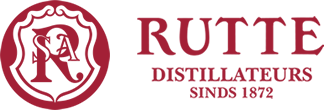



Rutte has a long history; recipes have been passed on from generation to generation. Whereas the industry was looking for cheaper methods and materials during the last century, this ‘innovation’ completely passed by the Rutte family. And that’s a good thing because it means old recipes and craftsmanship have been preserved. Even though the distillery has not been in the hands of the Rutte family since the 1990s, the tradition is kept alive and the company stills follows the same unique distilling process as ancestor Simon did in his days.
Flavour is something that develops but Rutte’s basic principles have never changed and are unique in the Netherlands:
Rutte’s products give you the unique and pure flavour of fresh fruit, herbs and spices. Rutte does not buy juniper berry oil or orange extract, it gets the flavours from the natural product via two traditional methods, distilling and extraction.
Distilling
A distiller can do a lot of magic with a still. The copper potstill is filled with alcohol, herbs or fruit and is then heated up. The alcohol evaporates, together with the volatile elements of the herbs or the fruit. These are mainly ethereal oils, the beautiful aromas nature has to offer, which determine the flavour.
The vapours are discharged and cooled down, causing them to condense and form a colourless distillate that ‘captures’ the flavour of the herbs and fruit.
Extraction
It is also possible to ‘retrieve’ the flavour from fruit or herbs. In order to prepare an extract, herbs and/or fruit are infused in a mixture of alcohol and water. Extracts achieve their maximum flavour only after a couple of weeks or months. Examples of natural products that Rutte turns into extracts include blackcurrants, cherries, orange peel and a range of aromatic herbs such as vanilla and coriander. An extract always gets its colour from the natural colours of the fruit or the herbs.


A distiller is a kind of master chef; distillates and tinctures are too strong to drink, so various semi-finished products are used to compose a recipe in order to turn them into tasty genever or liqueur. Rutte’s recipes are highly complex; it isn’t at all rare for dozens of different herbs and fruits to end up in a single product. They may be ingredients you expect such as juniper berry in genever but also unusual ones such as St John’s bread carob or angelica.
Knowing which flavours can be combined successfully; how to make a product that little bit more refreshing, fuller, more beautiful; that’s magic and craft rolled into one, combined with a lot of experience.
The Rutte family is still with us
Rutte’s team is still building on the heritage of the various generations. Their knowledge of nature and the craft have resulted in many new recipes during past centuries. Rutte still uses the old books of recipes for the development of new products. The result: new drinks using the knowledge of past Rutte generations; a wonderful posthumous collaboration.
Apart from the distiller’s craftsmanship, the quality of the pot still is of vital importance in order to achieve the right result.
When they visit Rutte, visitors expect enormous stills but they are, in fact, a lot smaller. The distillate that flows from the still is not the end product. The natural herb or fruit flavour is extremely concentrated which is why a distillate is a semi-finished product. Malt wine, grain alcohol, water and other distillates and tinctures are added to turn it into genever or liqueur.
Vulkaan 1
The very first pot still the Rutte family ever used still stands. We’re not sure why it was called De Vulkaan (the Volcano) but perhaps it’s because it causes an eruption of flavours.
These days, the pot still is used for small batches or testing.
Vulkaan 2
Unfortunately, we don’t know anything about this one. One of the previous generations probably got rid of it, which is a shame, because we would have loved giving it a special place in our distillery.
Vulkaan 3
In 1991, John Rutte discovered a beautiful old pot still at an antique dealer in Auvergne. He had it restored and designed the lid himself. Vulkaan 3 produced wonderful things but after almost 20 years of hard work, it was ready to retire.
Vulkaan 4
A brand new copper pot still was installed in 2013, tailor-made for Rutte by craftsmen in Germany, true coppersmiths, a craft that has all but disappeared in the Netherlands. In contrast with the previous two, this still is heated up eau-bain-marie. This is done gradually, making it possible to pay extra attention to the distillation process.


The Rutte family has been maturing genevers in casks from the very beginning, when it wasn’t customary to do so. In earlier centuries, Dordrecht became a city of high importance for the wine trade thanks to its riverside location. That’s why Rutte traded in wine; it was sold in their own shop and used in its products. The empty wine casks were then filled with genever. This resulted in a colourful collection of all kinds of casks, including Bordeaux, sherry and port casks.
The distiller uses his craftsmanship to compose the matured genevers and korenwijnen. He mixes and tastes every product and then creates the perfect blend; different casks of different ages. Koornwyn XO, for instance, Koornwyn XO is a mixture of 1 year old matured liquid on virgin casks (new wood) and 4 years old matured liquid on single used bourbon casks.
Because Rutte is still housed in the original building, right in the old city centre, there is only room for 40 small casks. The remainder of the collection can be found at fellow distillers such as De Kuyper in Schiedam and Filliers in Deinze, Belgium.
A cask of genever
It’s possible to own your own cask at Rutte. If you have any questions about this contact us.